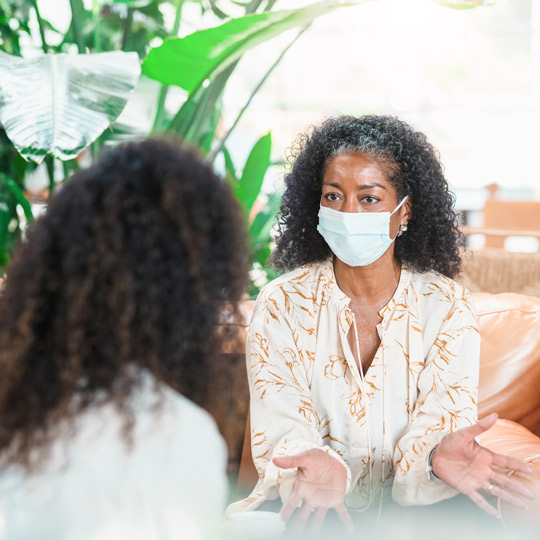Hearing aid adjustments can help communication for people who have hearing loss while we continue to wear masks in public places.
Masks will be with us for a while longer as the world fully recovers from the COVID-19 pandemic.
Though masks help keep us safe from the virus, they also cause issues for people who have hearing loss – whether that’s getting tangled with a hearing aid or creating difficulty in understanding what someone is saying. But there are strategies that can help.
Gina P. Angley, an audiologist and Associate Director of the Adult Hearing Aid Program at Vanderbilt Bill Wilkerson Center, said she and her colleagues have been more aware of this added complexity while working with their patients, but that recommendations always come down to what is best for the patient in the long run. Whether it’s time for a hearing aid is based on individualized assessments, not whether we’re in a period of masking like we are now, but it is a discussion point and consideration.
This far into the pandemic, a variety of ear-free masks and accessories now exist to help avoid tangling with hearing aids, such as top-tie masks, headband masks, and ear-saver masks straps. For those who are communicating with someone with hearing loss, clear vinyl masks that make lipreading possible are more available than they were at the beginning of the pandemic, and patterns exist for making your own.
The bigger obstacle that remains is the muffling of voices. Wearing masks naturally decreases the audibility of those sounds, especially high pitch or high frequency sounds, which is where we get clarity. That’s also the area where many people experience hearing loss as we age.
“Now, you’ve got a mask that’s muffling the talker, and that’s making that high-pitch information even worse. So people are really at a disadvantage,” Angley said. “Even people with normal hearing are disadvantaged in terms of understanding people or communication with a mask on. So are people with hearing aids.”
For those who wear hearing aids, a program can be added to most hearing aids where a boost is given to those high pitch sounds to account for the reduction in sound from the mask. This program can be added by an audiologist or if you have a hearing aid that can connect with a smart phone, you could adjust it using the phone application for your devices. If your hearing aid isn’t giving you the support you need, it might be time to visit an audiologist for an adjustment or upgrade.
For everyone with hearing loss, now more than ever, it’s crucial for people to advocate for themselves.
“When you are out in public, don’t be hesitant to say, ‘I have hearing difficulties, I need you to please speak up and speak slower,” Angley said. “And if you’re the person talking to someone with hearing loss, it all goes back to good communication strategies: Make sure you’re getting the person’s attention before speaking, that you’re as close to the person as you can be, and make sure that you’re face to face.”
Given social distancing recommendations of 6 feet, it’s especially important to eliminate other barriers including minimizing noise around you, like TVs, radios and fans. Otherwise, moving the conversation to a place where it’s easier to hear is helpful. Tapping someone on the shoulder to get their attention so they can really focus on what is being said goes a long way.
Especially while we’re in this time of masking, having tablets, whiteboards and paper and pens handy also helps – especially in places where masks are more likely to be required, like medical offices and public places. Gadgets like speech-detection apps can translate, and sound-amplifying apps are helpful to some.
But if communicating through masks becomes too stressful, moving to virtual visits and video chats can be better alternatives at times.
Most of all, Angley said, be supportive.
“Letting someone know they’re not alone in their struggles can be reassuring and comforting – we’re all struggling with communication out in public with the implementation of masks and we will get through this together.”

Vanderbilt Bill Wilkerson Center
If you suspect hearing loss, Vanderbilt Audiology and Hearing Aids can help.

